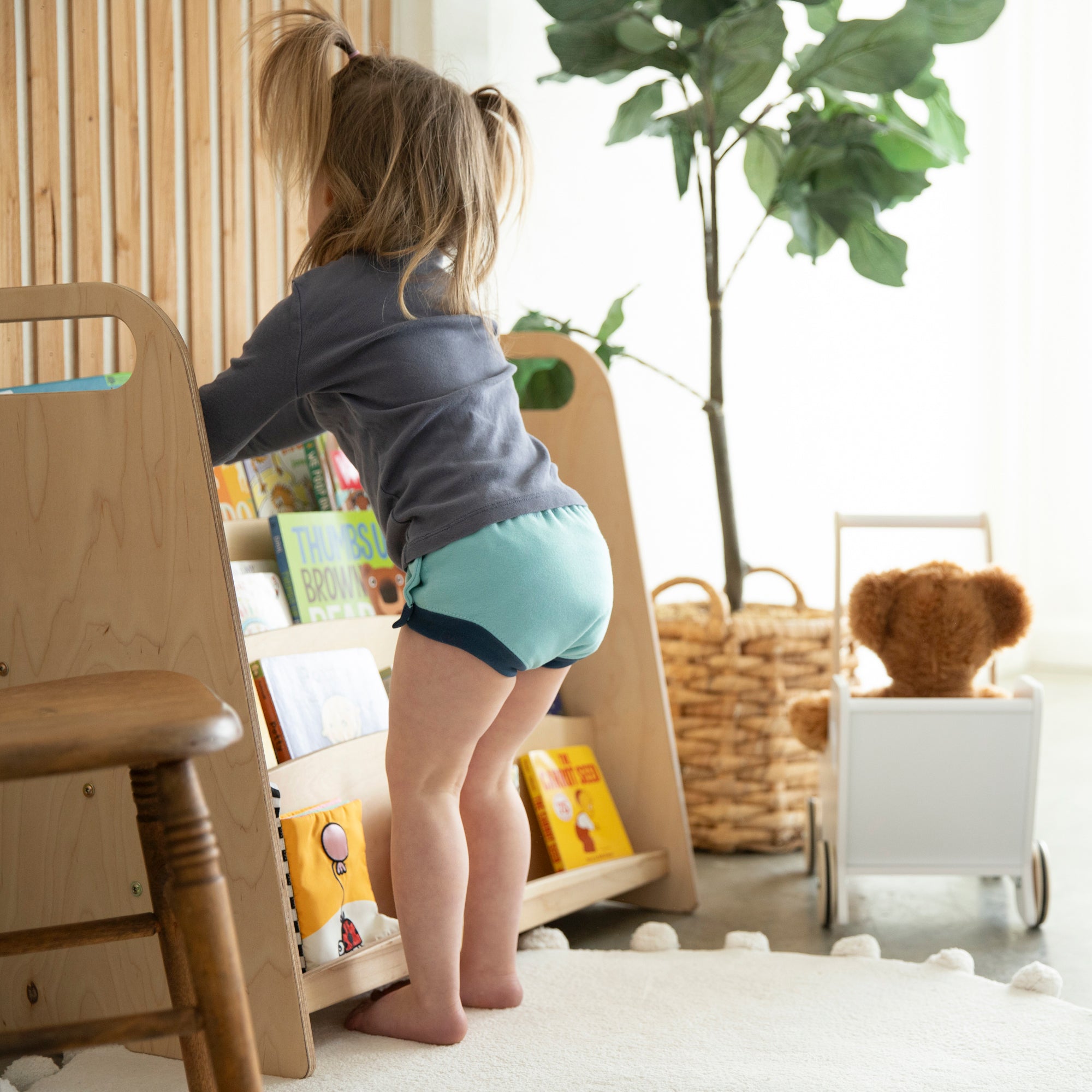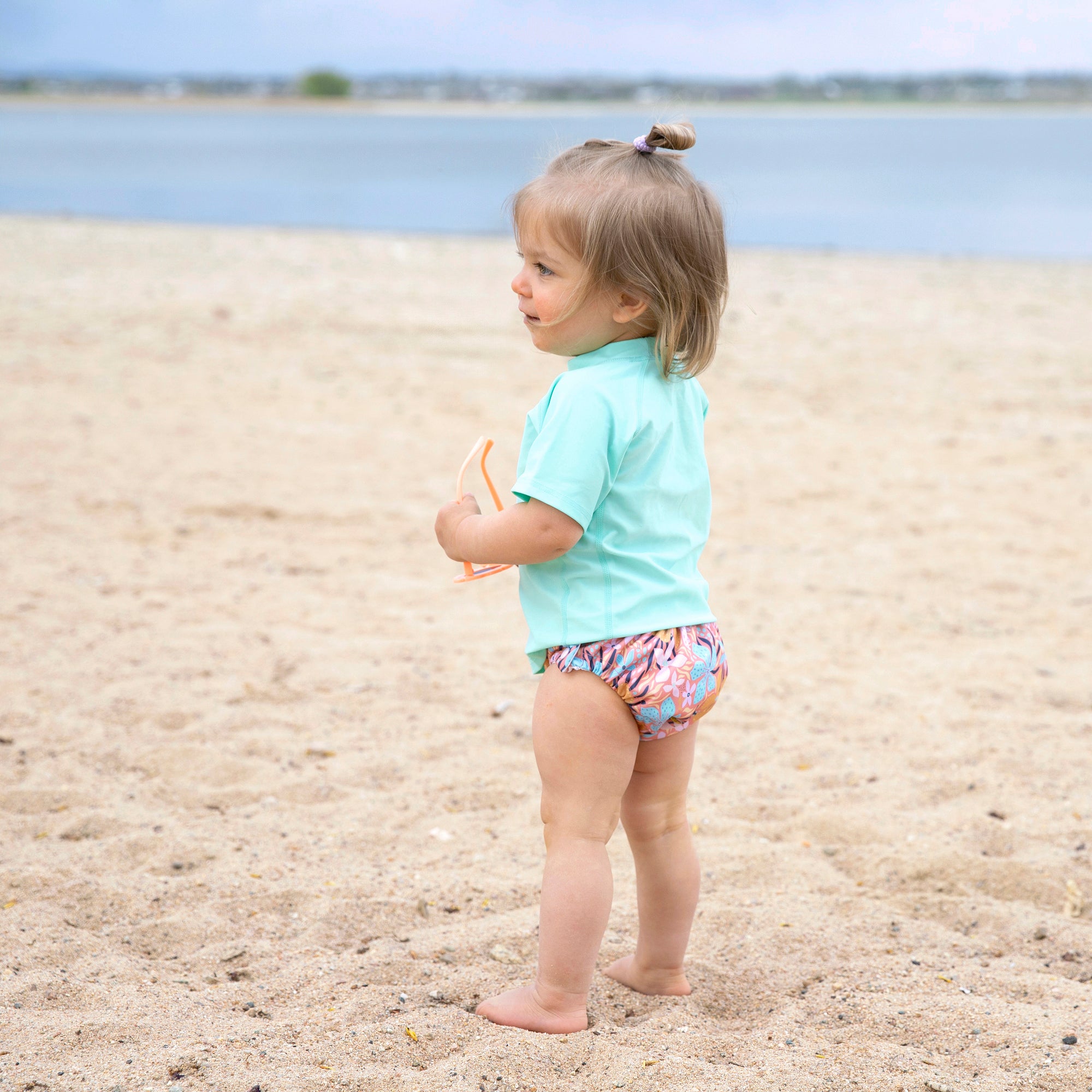Before wearing... Wash all diapers at least one time before use. Washing and drying your hemp and natural cotton diapers at least 3 times before use will wash away the natural oils that inhibit absorption. You can add them to your normal white laundry for the initial 3 wash/dry cycles, to save on water and energy. Diaper changing station... Shake solids into toilet after each diaper change. Store your soiled Thirsties® Cloth Diapers in a DRY diaper pail. A standard 52-quart garbage pail with a lid works great and can be purchased at your local department store. Be sure to line your pail with a Thirsties® Deluxe Diaper Pail Liner to avoid having to clean your pail on every laundry day. Simply dump the diapers into the washer and throw in the pail liner for every cloth diaper load. If you have a second liner on hand, place into the diaper pail, and you are ready to add more diapers while the others are being laundered. Store your Thirsties® Fab Wipes on or near your changing table along with Thirsties Booty Luster, or your favorite wipes solution. Toss soiled wipes into your pail along with your diapers. Follow diaper changes with a cloth diaper safe rash cream if needed. Our first recommendation would be our very ownBooty Love diaper ointment. Made with certified organic oils to moisturize and nourish your baby’s sensitive skin, and natural herbs to relieve dry skin and rashes. It can also be used to aid in the healing of minor cuts, burns and skin irritations. If Thirsties Booty Love is not available, some other good brands to use are: Angel Baby Bottom Balm (Diaper rash, cuts, scrapes, insect bites, burns) Baby’s Bottom Butter (Diaper rash, thrush / sore nipples, bug bites, cuts, healing perineal tissue, chapped skin) Magic Stick (Diaper rash, skin irritations) Motherlove (Diaper rash and thrush) Northern Essence Diaper Salve (Diaper rash) Northern Essence Better Butter Cream (Diaper rash and yeast infections) Note: Using a non-approved diaper cream or ointment may cause repelling of your cloth diapers, and void your warranty. Pre Wash Before laundering attach Aplix hook and loop to rectangular laundry tab on the inside of diaper. This step will help eliminate the diaper from becoming tangled in the wash or dryer and will lengthen the life of your Aplix. *Although soaking can aid in stain removal, we do not recommend soaking anything but natural fiber diapers for any longer than 10 minutes. This is due to the fact that it can eat away at lamination, and lock in odor. This will void your warranty. For optimum cleanliness, limit the size of your load to no more than 18 M/L or 24 XS/S diapers and wash every other day (plus inserts and wipes). You will need to use an adequate water level on your washer for your diapers. Use warm water and a small amount of detergent for the pre-wash cycle to help pre-clean your diapers. If you do not have a pre-wash cycle on your washer, a short or quick wash cycle will work just as well. For HE machines, we suggest a load of 12-15 diapers. Diapers need a good amount of water to clean them properly, and HE machines do not normally use an adequate amount of water. Use the heavy cycle option if that is available. To trick the washer into adding more water, add a large, wet bath towel to each load. You will use this in the prewash cycle, and leave in for the wash and rinse cycles. Wash Choose a HEAVY cycle and wash on HOT for the main wash, using an adequate water level. You will want to use enough water to soak the diapering items and to cover them. The diapers should have a bit of room to move around. Please be sure not to use temperatures over 130 degrees for any item with components. Use the recommended amount of cloth diaper safe detergent per load. Hard water may need more detergent. Most detergents on the market will leave a residue on your diapers that will affect the absorbency and will cause odors and diaper rash. Please avoid soaps as well as additives such as bleach, fabric softeners, brighteners, and dyes. These can not only harm your diapers, but your baby's sensitive skin as well. As a general rule, please avoid: Bleach Fabric Softeners Pure Soap For diapers or covers with components such as Aplix, elastic, and lamination, please also avoid: Borax Sanitize cycles Washing Soda as an additive These practices and/or additives can void the warranty on your Thirsties products. If you need to disinfect your diapers due to infection, please contact us and we will be happy to help find a solution. Rinse on warm, adding an extra rinse. Avoid all soaps, many "Free & Clear", and popular baby detergents. Most detergents on the market will leave a residue on your diapers that will affect the absorbency and will cause odors and diaper rash. Be sure not to use chlorine bleach or fabric softeners. Oxygen bleach is safe for occasional use. Dry... Hang your cloth diapers to dry or dry in dryer on low. Inserts, flats, and prefolds may be dried on higher settings. *Drying in the dryer will hasten the life of any diapering product. Add a dry towel to the dryer to speed the drying process. Drying in direct sunlight is the very best method for drying and disinfecting. Hang drying also helps to preserve the textiles of your diapers and is great at getting rid of stains. Cotton and hemp diapers will be somewhat stiff when hung to dry. One option to soften sun-dried textiles made from natural fibers is to use the dryer while still slightly damp, and adding a wool dryer ball. Stay tuned next week for Basic Care and Use Tips for Cloth Diapers: Part 2
OUR BESTSELLERS
Parent Tested, Baby Approved



